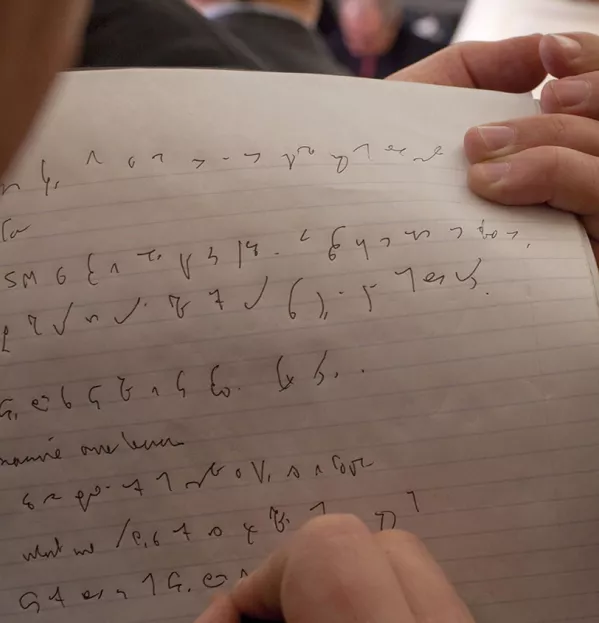
A shorthand guide to the Kyle Gunn controversy

Who is Kyle Gunn?
A 19-year-old college student making a name for himself as a sports journalist.
What happened to him?
He was told that he would fail a journalism course without shorthand, a skill he cannot learn because he has cerebral palsy.
Where was the course?
Kyle had spent a year completing a media studies qualification at Glasgow Clyde College and had planned to start a two-year HND in practical journalism, but hit a stumbling block at the interview. He told the Glasgow Evening Times that the Scottish Qualifications Authority (SQA) had advised that shorthand was essential. “I already do a lot of my work electronically, so I don’t understand why there is such a big issue about this,” said Kyle.
What was the reaction?
After Kyle spoke of the “upsetting” situation - “I have interviewed many footballers and managers, and my disability hasn’t stopped me from doing that,” he said, according to one report - supportive messages poured in, prompting a debate about how inclusive education really is in 2017.
What did equality groups say?
The Equality and Human Rights Commission Scotland said: “On the face of it, it seems this requirement needs to be urgently reviewed and updated. It cannot be right that such an outdated rule is prohibiting disabled people from entering a profession in which they are woefully underrepresented.”
Who else offered support?
BBC investigative journalist Mark Daly said the decision should be reversed. St Mirren FC manager Jack Ross, whom Kyle has regularly interviewed, said most journalists now used recorders rather than shorthand, and called for the situation to be resolved quickly so that Kyle could pursue his passion.
Baroness Brinton, president of the UK Liberal Democrats, who uses a wheelchair, also tweeted that problems with access to TV studios were made worse by the scarcity of disabled journalists, which has served to reinforce a “self-perpetuating cycle”.
Did politicians get involved?
Yes. Local MSPs Maurice Golden and Ross Greer offered their support. Mr Golden, who raised Kyle’s situation in Parliament, said: “We should be encouraging people with disabilities to pursue their dreams, not putting up barriers.” First Minister Nicola Sturgeon promised to look into the case, and Conservative leader Ruth Davidson - a former BBC journalist - tweeted that cerebral palsy “should be no barrier” to Kyle’s journalism training.
How did the government respond?
It called on the SQA and the college to “ensure all options are being explored”. The government also said that it was committed to “a fairer Scotland” in which everyone has “access to equal opportunities”. A spokesperson added: “We expect all public and other bodies to support those ambitions.”
Has the official position on shorthand changed?
The SQA said in an initial statement that it designed assessments to meet the requirements of the National Council for the Training of Journalists (NCTJ), including shorthand. Three days after the original news story broke, however, it emerged that the shorthand requirement would be reviewed after the NCTJ said it was an “elective” component and that learners could complete the course without shorthand.
The SQA said it was seeking “urgent clarification” on the NCTJ’s conditions for exemption. Two days later, on the Friday before the course started, the SQA said it had decided to offer two qualifications at HNC and HND level in practical journalism - one with shorthand and one without shorthand. An SQA spokesman told Tes Scotland that it had transpired that the NCTJ had allowed exemptions for disabled students in the past.
What did the college say?
Even before the SQA’s Friday afternoon announcement, a spokeswoman for Glasgow Clyde College said that Kyle was still on the course and that - before his case had come to public attention - the college had proactively sought ways to make “reasonable readjustment” so that no obstacles would stand in the way of his participation.
Isn’t shorthand an obsolete skill anyway?
Plenty of journalists manage fine without it and, in 2016, vocational education group City and Guilds said that over the previous decade there had been a “steady decrease” in the number of people taking shorthand courses. However, the skill is essential for court reporters, who are not allowed to use recording devices. Shorthand also allows for quick transcription of interviews.
Good shorthand notes have previously helped some journalists to ward off legal action; in 1999, Times reporter Matt Dickinson presented his notebook as evidence after then England football manager Glenn Hoddle claimed that he had been misquoted as saying that disabled people were being punished for sins in a previous life.
So shorthand notes offer cast-iron protection in legal cases?
Not necessarily. In 2010, the Daily Telegraph paid libel damages to Portuguese footballer Cristiano Ronaldo after a reporter’s messy shorthand notes were deemed insubstantial evidence to justify the offending story.
You need a Tes subscription to read this article
Subscribe now to read this article and get other subscriber-only content:
- Unlimited access to all Tes magazine content
- Exclusive subscriber-only stories
- Award-winning email newsletters
- Unlimited access to all Tes magazine content
- Exclusive subscriber-only stories
- Award-winning email newsletters
You need a subscription to read this article
Subscribe now to read this article and get other subscriber-only content, including:
- Unlimited access to all Tes magazine content
- Exclusive subscriber-only stories
- Award-winning email newsletters
- Unlimited access to all Tes magazine content
- Exclusive subscriber-only stories
- Award-winning email newsletters